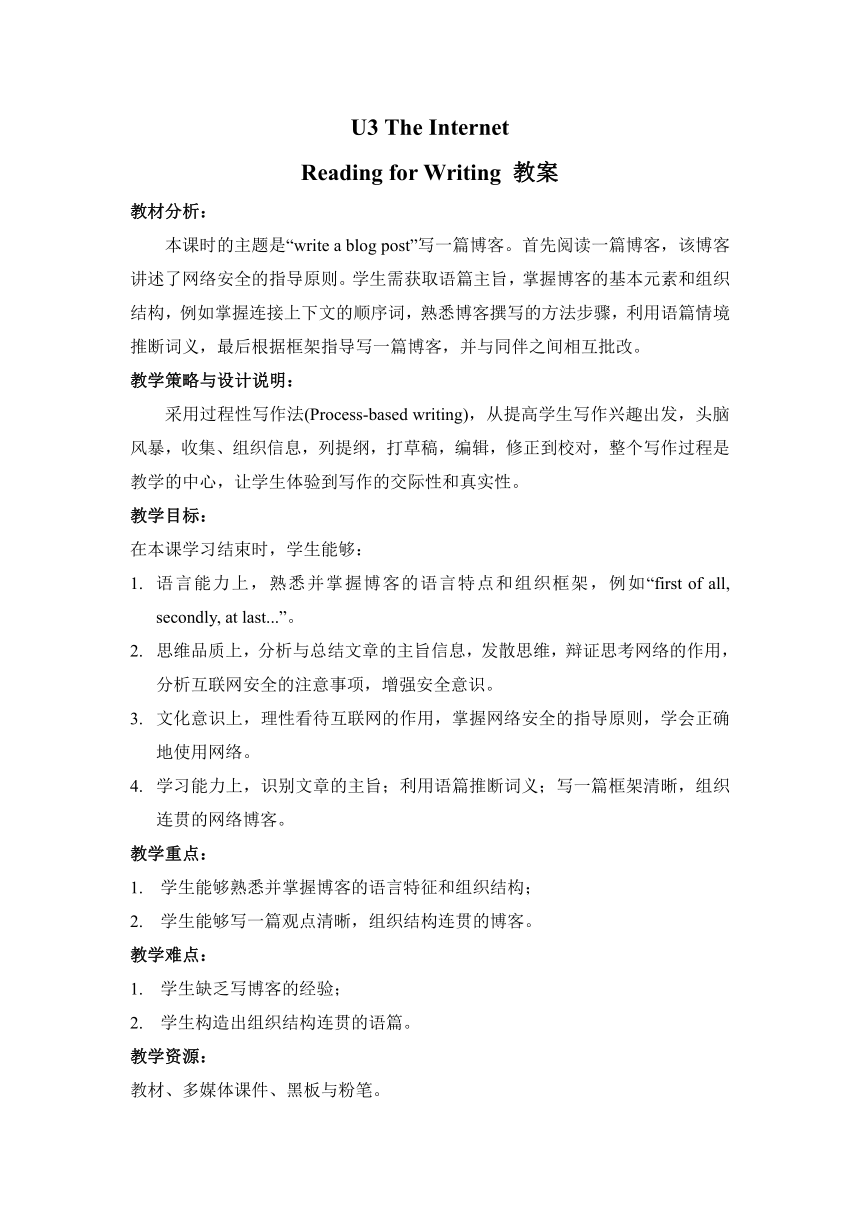
U3 The Internet Reading for Writing 教案 教材分析: 本课时的主题是“write a blog post”写一篇博客。首先阅读一篇博客,该博客讲述了网络安全的指导原则。学生需获取语篇主旨,掌握博客的基本元素和组织结构,例如掌握连接上下文的顺序词,熟悉博客撰写的方法步骤,利用语篇情境推断词义,最后根据框架指导写一篇博客,并与同伴之间相互批改。 教学策略与设计说明: 采用过程性写作法(Process-based writing),从提高学生写作兴趣出发,头脑风暴,收集、组织信息,列提纲,打草稿,编辑,修正到校对,整个写作过程是教学的中心,让学生体验到写作的交际性和真实性。 教学目标: 在本课学习结束时,学生能够: 语言能力上,熟悉并掌握博客的语言特点和组织框架,例如“first of all, secondly, at last...”。 思维品质上,分析与总结文章的主旨信息,发散思维,辩证思考网络的作用,分析互联网安全的注意事项,增强安全意识。 文化意识上,理性看待互联网的作用,掌握网络安全的指导原则,学会正确地使用网络。 学习能力上,识别文章的主旨;利用语篇推断词义;写一篇框架清晰,组织连贯的网络博客。 教学重点: 学生能够熟悉并掌握博客的语言特征和组织结构; 学生能够写一篇观点清晰,组织结构连贯的博客。 教学难点: 学生缺乏写博客的经验; 学生构造出组织结构连贯的语篇。 教学资源: 教材、多媒体课件、黑板与粉笔。 教学过程: 步骤 教学活动 设计意图 时间与模式 Step 1 Lead-in: T raises the following questions. 1.Have you ever read blog posts T gives a definition of blog post, and show some pictures of typical blog websites. 2.How do you think of blog posts T asks Ss to make comments on blog posts they have read. For example, blogs I read before are really interesting because of vivid language and various topics. 创设问题情境,激活学生的背景知识。 10’ CW Step 2 Read and answer: Ss read the blog and answer the following questions. (T leads Ss to think about the answers to questions: title should be clear, easy to read, and attractive; guideline involves first, then, also, ...) Suggested answers: 1. Main idea: How to stay safe online and avoid bad experience on the Internet. Title: How to Stay Safe Online 2. ① Leave the site immediately if it makes you uncomfortable. ② Protect your privacy. ③ Be polite. 3. Troll and cyberbully. 4. ① Avoid using same passwords. ② Download only from secure websites and official app stores. 获取文章主旨和细节信息,提高学生阅读技能;发散思维,思考网络安全的方法。 10’ IW/CW Step 3 Discussion: After reading the blog, Ss need to think about some questions. 1. Do you agree with the guidelines of the blog Why 2. Ss discuss the question “What are the effects of cyberbullying online ” Suggested answers: Anger, isolation, depression, illness... T raise the question “How to stop cyberbullying online ” Suggested answers: LOG OFF the site where cyberbullying is happening. BLOG EMAILS or messages. Don't respond to them. SAVE THE MESSAGE or email and show an adult. TELL SOMEONE you trust. 提出深度问题,激发学生的发散思维。全面了解博客中所提到的内容。 5’ CW Step 4 Key words: T teach the key words by giving related collocations and examples presented as follows: Theft Rude Target Upset Particular 通过图片和例子对重 ... ...
~~ 您好,已阅读到文档的结尾了 ~~